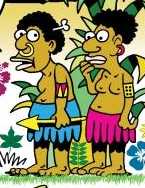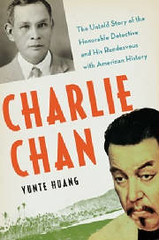Michael Cooke couldn't refute this argument so he mostly ignored it. But he did address one of my claims:
Because if I dress like a soldier with fake medals and pantomime the killing of women and children--it can and will offend people that support the military. But it is not immoral, it is expressing a controversial idea. There is a real distinction. Offending is not nice--but it sometimes it might be a good thing! The right thing!
First, there's no necessary distinction between an act's being morally wrong and expressing a controversial idea. An act can be or do both. Examples: Screaming profanities at children because you think they deserve punishment. Publishing false reports about presidents because you believe they're a menace to society. Blowing up buildings to protest what you consider an unjust government policy.
Second, I didn't say the hypothetical headdress or medal wearer was expressing a controversial idea. He might or might not be. Suppose the medal wearer exposes himself or urinates in public view. He might do this because he likes insulting soldiers. Or because he genuinely thinks it's funny. Or because he sincerely believes that's what real soldiers do. Not because he has a controversial idea in mind.
So your "controversial idea" defense is as invalid as your other made-up defenses. I don't need to refute it because wearing headdresses or medals isn't about expressing controversial ideas. Try again.
As for why non-Natives wearing headdresses is morally wrong, I thought that was obvious. By stereotyping Indians you're presenting false or misleading information about them. Depending on what you say or do, it's an implicit or explicit lie.
Moreover, this practice offends some people's beliefs, same as pissing on a Jesus figure or publishing a Muhammad cartoon might. If you had a damn good reason for offending people, such as expressing an important "controversial idea," you might be able to justify it. But I just dismissed that as a valid excuse. Few if any headdress wearers have a message beyond the stereotype.
So you're spreading misinformation and offending people for no good reason. If you don't understand why that's wrong, I'm not wasting more time explaining what "wrong" means. I'll accept that you're too dumb to understand it.
If you don't like the term "morally wrong," try "intellectually wrong," since that's also true. Or just "wrong," period.
More idiocy from Cooke
Besides, how real or fake it looks doesn't change the stereotypical effect. People believe headdress-wearing chiefs represent all Indians because they see them over and over. Real chiefs, fake chiefs...it doesn't matter. The quantity counts much more than the quality.
In fact, you could argue that fake headdresses have more of an effect than real headdresses. If headdresses are so ubiquitous that you can find them in costume shops, they must represent Native culture, right? At least, that's what many people may think.

If you think a chief's headdress taken out of context isn't a stereotype, you don't know what a stereotype is. I'm not wasting time alleviating your ignorance of basic words and concepts. Try a dictionary.
For more of Cooke's failed arguments about Kesha, see Headdresses = Fedoras? and Stereotypes in Cultural Commons?
America appropriates everything?
With your "America appropriates EVERYTHING" claim, you're back to your cultural commons idea. Which means you're back to explaining why minstrel shows and Polish jokes were okay but aren't any longer. Why don't you stop ducking the question and start answering it?
As for the class issue, I addressed that in Is Racism Really Classism? Short answer is that racism and classism are interrelated and battling one helps battle the other.
Finally, Cooke says something that almost makes sense:
I see the moral issue being one of respect and dignity. Where second class status is not real, almost always culture is shared gladly and happily and the pain of appropriation evaporates.
For more on the subject, see The "Honor" of a Plains Chief and Is Cultural Appropriation Okay?
Below: America appropriated Chinese culture to create Charlie Chan, so he can't be racist, according to racism apologist Michael Cooke.


3 comments:
"Ke$ha wore the headdress to make a gender bending suggestion"
That might have been edgy and daring when Cher did it .... DECADES AGO (all stereotype issues aside). Now it is a merey cliche. If the purpose is for Kesha to catch up with Lady Gaga on the "shock costume" thing, then she's only about 40 years behind.
Lady Gaga wore Indian headdresses too in her Pop Burlesque cabaret show before she became famous.
Keke & Gaga's spiritual grandmother Madonna has never worn one to my knowledge.
Madge had been gender bending way before these two even born.
Just sayin :)
Good point, DMarks. For more on the subject, take The Hipster Headdress Challenge.
Post a Comment